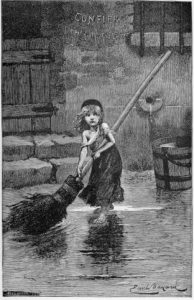Interpreting works of literature is always a dicey task—it’s all too easy to find the conclusions we want to find and turn authors into spokesmen for our own ideas. In these reflections on Victor Hugo’s Les Misérables, I don’t claim that what I say is necessarily what Hugo himself intended. That said, though, his unforgettable story gives worthwhile insights into the workings of a free and virtuous society.

“The book which the reader has before him at this moment is, from one end to the other, in its entirety and details…a progress from evil to good, from injustice to justice, from falsehood to truth, from night to day, from appetite to conscience, from corruption to life; from bestiality to duty, from hell to heaven, from nothingness to God. The starting point: matter, destination: the soul. The hydra at the beginning, the angel at the end.”
Progress from evil to good, though, obviously includes concern for the poor, and in this vein we can draw some interesting conclusions. Hugo’s concern makes it all the more striking that he never demonizes Jean Valjean’s wealth. Jean Valjean builds a business and gets rich doing it—and this is a good thing. Hugo makes a point of describing how Valjean’s ventures bring order and prosperity to the city and dignity to its inhabitants. It’s worth quoting at length:
“This prosperity created at M. sur M. by Father Madeleine [Valjean] had, besides the visible signs which we have mentioned, another symptom which was nonetheless significant for not being visible. This never deceives. When the population suffers, when work is lacking, when there is no commerce, the tax-payer resists imposts through penury, he exhausts and oversteps his respite, and the state expends a great deal of money in the charges for compelling and collection. When work is abundant, when the country is rich and happy, the taxes are paid easily and cost the state nothing. It may be said, that there is one infallible thermometer of the public misery and riches,—the cost of collecting the taxes. In the course of seven years the expense of collecting the taxes had diminished three-fourths in the arrondissement of M. sur M., and this led to this arrondissement being frequently cited from all the rest by M. de Villèle, then Minister of Finance.”
Valjean’s factories are a source of good. They make the region prosperous and self-sufficient, they reduce the government’s expenses, and they give people not handouts but real and meaningful work. They make Jean Valjean rich, and the whole district richer with him. Is he taking money from the poor? Of course not, and the people of the region recognize this. There’s no “occupy Valjean” movement because he is a force for good. Everyone knows him and sees what he does on a personal level, and they saw him build what he built. They see his personal charity and that he himself is a good man.
Today’s context is much changed, but the qualities of personal virtue and attention are ones that we should strive for in any context. Obviously not every entrepreneur is Jean Valjean, and Hugo makes no claim that this is the case, but he does provide a model worth imitating and recognizing.
Hugo also seems to emphasize the importance of personal connections in efforts to do good. His two shining examples of those who help the poor—the bishop and Jean Valjean himself—represent personal virtue and concern for others in more than just a financial sense. The bishop sends him on his way with resounding words:
“Do not forget, ever, that you have promised me to use this silver to become an honest man….Jean Valjean, my brother, you no longer belong to evil, but to good. It is your soul I am buying for you. I withdraw it from dark thoughts and from the spirit of perdition, and I give it to God!”
Jean Valjean emerged from prison as one of Hugo’s title misérables, but Bishop Myriel puts him on the road to redemption. He gives him the stolen silver, but what he really gives him is a sense of worth and an example to follow. And this bears tremendous fruit.
The orphaned Cosette is a particular recipient of this fruit. Abused and without hope in the Thénardiers’ inn, she is warmed simply by Valjean’s presence when he comes in search of her.
“For the last five years, that is to say, as far back as her memory ran, the poor child had shivered and trembled. She had always been exposed completely naked to the sharp wind of adversity; now it seemed to her she was clothed. Formerly her soul had seemed cold, now it was warm. Cosette was no longer afraid of the Thénardier. She was no longer alone; there was some one there.”
At this point Cosette is still slaving away in the inn, still cold, still dressed in rags—but the very fact that another person seems to care for her changes everything. This is the personal closeness that no amount of money, no government program, and no economic system in itself can give.
We should be wary of putting Hugo into our preconceived categories, especially based only on these ideas. The full range of his opinions likely differed a great deal from our own. But of course the value of the book is undeniable apart from what we may or may not think of Victor Hugo’s opinions. Like any great work, it stays with us and leaves us with a trove of ideas worth probing.